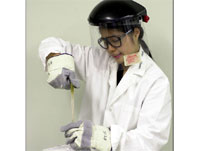|
|||||||||||
| Biotechnology | |||||||||||

Biotechnology involves harnessing microbial, plant and animal cells and their components for the benefit of people. The essential feature of biotechnology is the use of biological processes based on living cells and biochemical molecules such as proteins, DNA and RNA.
Biotechnology is a rapidly growing industry and is expected to be one of the most important sciences for the future. The recent explosion in knowledge of genetic engineering and related sciences has led to the production of innovative products and processes of vital importance to the food, pharmaceutical, chemical and environment related industries. Biotechnologies are also used in extraction of precious minerals from low grade ores and for the treatment of sewage and toxic soils. Biotechnology graduates find employment in a wide range of organisations employing biotechnological techniques and their commercial applications. They have been actively recruited by multinational pharmaceutical companies and other local and international companies. In addition, the industry and business orientation of the course opens up opportunities in technology evaluation and management, government and industry. Studying Biotechnology at UNSW The study of Biotechnology at UNSW is primarily through the School of Biotechnology and Biomolecular Sciences (www.babs.unsw.edu.au). Please see the table below for a list of the postgraduate programs offered.
Biotechnology can be studied as
|
|||||||||||



